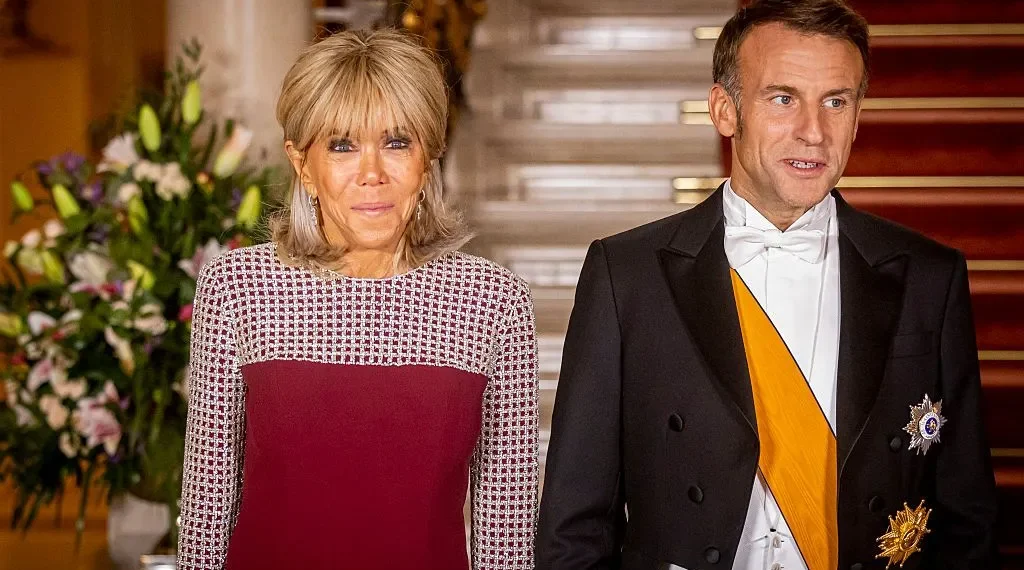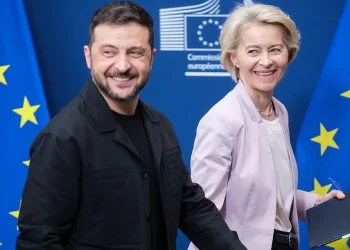The daughter of French First Lady Brigitte Macron told a Paris court that years of online harassment and false claims about her mother’s gender have severely affected her health and emotional wellbeing. The testimony came during the trial of ten people accused of spreading defamatory conspiracy theories targeting France’s presidential couple.
Tiphaine Auzière, 41, the daughter of Brigitte Macron from her first marriage and stepdaughter of President Emmanuel Macron, spoke on the second and final day of hearings. She described the constant flow of online abuse as “deeply damaging” and said it had changed her mother’s life in ways that were both visible and distressing.
A Family Under Digital Siege
“It is important to be here today to express the harm my mother has faced,” Auzière told the court. “I wanted to give an account of what her life has been like since she started being targeted by these attacks.”
She said her mother’s health had “deteriorated” since the spread of false claims alleging that Brigitte Macron is a transgender woman — a conspiracy that began circulating on French social media several years ago.
According to Auzière, the harassment has forced the First Lady to change how she dresses and carries herself publicly, aware that every image could be distorted or weaponized online. “She has had to be careful about her outfits, her posture. She knows perfectly well that her image will be used to support these theories,” she said.
Impact Beyond the First Lady
The attacks, Auzière added, have gone beyond personal distress and affected the Macron family as a whole. She told the court that even Brigitte Macron’s grandchildren had faced taunting and cruel remarks at school as a result of the rumors.
“Not a day goes by without someone mentioning these claims to her, even by people who mean well,” Auzière testified. “She hasn’t been elected. She hasn’t asked anything of anyone — and yet she is constantly under attack.”
The Trial Against Online Harassment
Ten defendants, aged between 41 and 65, are on trial for defamation and spreading false information about the French First Lady’s gender identity. Prosecutors have requested suspended prison sentences ranging from three to twelve months, along with fines of up to €8,000 ($9,300).
Among those accused are a local elected official, a gallery owner, and a teacher. One defendant, Aurélien Poirson-Atlan, is charged with telling his 200,000 social media followers that Brigitte Macron is transgender and suggesting that the 24-year age difference between the First Lady and the President amounted to “state-sanctioned pedophilia.”
In his defense, Poirson-Atlan told the court he was a “satirist” presenting an alternative view to “mainstream media.”
Repeat Offenders and Online Theorists
Two of the other defendants, self-described journalist Natacha Rey and online clairvoyant Amandine Roy, were previously convicted of slander in 2023 for claiming that Brigitte Macron never existed and that her brother had changed gender and assumed her identity. That conviction was later overturned on appeal.
Several defendants cited freedom of expression in their defense, with one even requesting that the Macrons publish photographs of Brigitte Macron during pregnancy to prove her biological gender.
Legal Action Extends Beyond France
The First Lady and President Macron are also pursuing separate legal proceedings in the United States against right-wing media commentator Candace Owens, who has repeatedly echoed the same false claims.
In March 2024, Owens publicly declared that she would stake her “entire professional reputation” on the allegation that Brigitte Macron is a man. In response, the Macrons’ lawyer, Tom Clare, told the BBC that the couple would present “photographic and scientific evidence” in U.S. court to refute the conspiracy once and for all.
“It is incredibly upsetting to think that you have to go and subject yourself to that kind of proof,” Clare said earlier this year.
A Decade of Personal Attacks
Brigitte Macron, now 72, has been France’s First Lady since Emmanuel Macron’s election in 2017. A former literature teacher, she first met her future husband when he was a student at the secondary school where she taught. The couple married in 2007, when she was 54 and he was 29.
Since her husband’s rise to power, the First Lady has faced scrutiny and misogynistic commentary about her age and appearance — but the gender-based conspiracy theory represents a particularly vicious evolution of that online abuse.
Experts on digital misinformation in France have said the case highlights the growing challenge of combating viral conspiracy narratives that blend misogyny, transphobia, and political hostility.
The Broader Significance of the Case
The trial in Paris reflects a growing effort across Europe to hold individuals accountable for targeted online harassment. French law treats “public defamation” and “cyber harassment” as criminal offenses, and courts have increasingly imposed penalties for spreading false claims about private individuals.
While France’s First Lady has no official political role, Brigitte Macron has often championed causes such as education, anti-bullying initiatives, and support for children with special needs — making the personal toll of the attacks particularly painful, according to her family.
For Auzière, the outcome of the trial is about more than legal accountability. “It’s about dignity,” she said. “My mother deserves peace after years of unfounded cruelty.”
This article was rewritten by JournosNews.com based on verified reporting from trusted sources. The content has been independently reviewed, fact-checked, and edited for accuracy, neutrality, tone, and global readability in accordance with Google News and AdSense standards.
All opinions, quotes, or statements from contributors, experts, or sourced organizations do not necessarily reflect the views of JournosNews.com. JournosNews.com maintains full editorial independence from any external funders, sponsors, or organizations.
Stay informed with JournosNews.com — your trusted source for verified global reporting and in-depth analysis. Follow us on Google News, BlueSky, and X for real-time updates.














